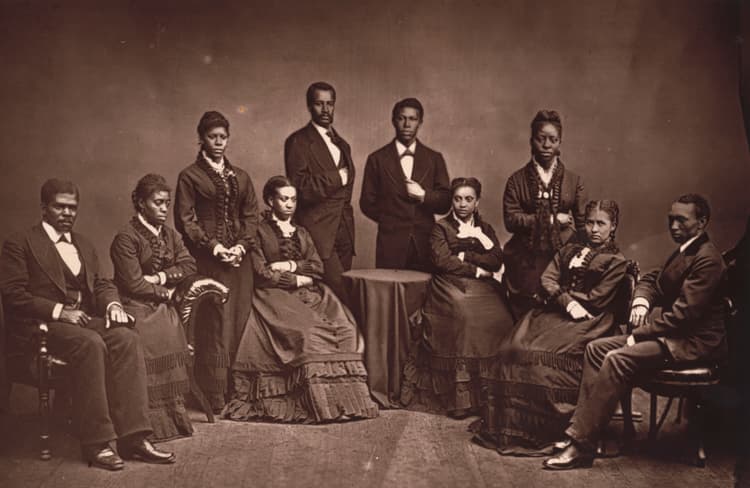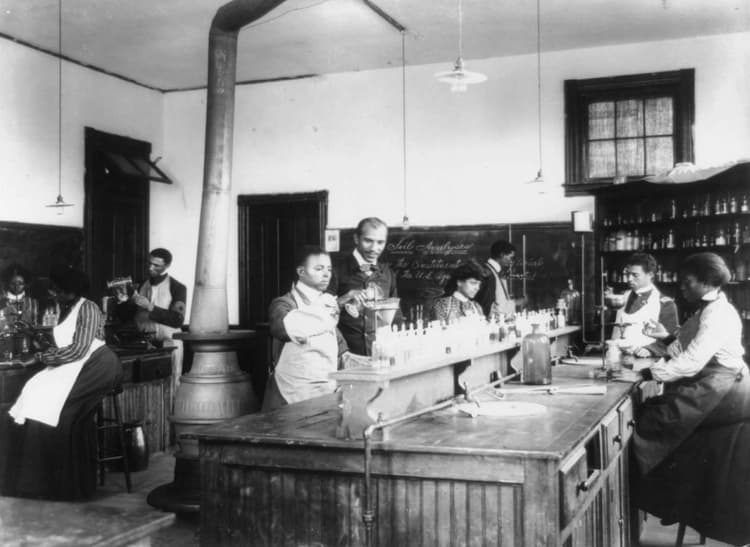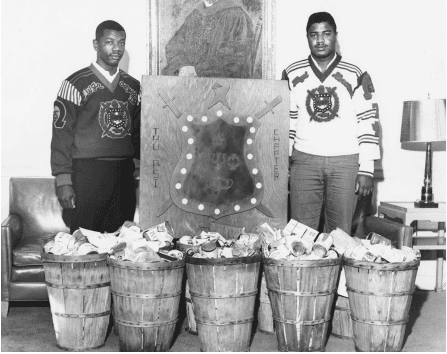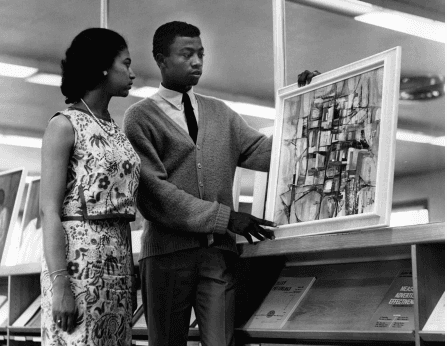HBCUs, Black Greek Letter Organizations, and Black Education
Maya Hall
8 min read
Listen to this study note
Study Guide Overview
This study guide covers Historically Black Colleges and Universities (HBCUs), including their origins (as a response to discriminatory practices), founding (post-Civil War and Jim Crow eras, including specific early institutions and the Second Morrill Act's impact), educational models (liberal arts vs. vocational, and key figures like Washington and Du Bois), and impact (on African American education, culture, activism, the Civil Rights Movement, and global influence). It also discusses Black Greek Letter Organizations (BGLOs) and provides visual aids for analysis. Finally, it offers practice questions and exam tips covering multiple-choice, short answer, and free-response formats.
#AP African American Studies: HBCUs - Your Ultimate Study Guide 🚀
Hey there! Let's get you prepped and confident for your AP exam. This guide is designed to be your go-to resource, especially the night before the test. We'll break down everything you need to know about Historically Black Colleges and Universities (HBCUs) in a clear, engaging way. Let's do this!
#1. Introduction to HBCUs
#What are HBCUs?
-
Historically Black Colleges and Universities are institutions of higher education established before 1964 with the primary mission of serving the African American community. They played a pivotal role during times of segregation and continue to be vital centers of Black education and culture.
HBCUs were not just schools; they were safe havens, cultural hubs, and training grounds for future leaders.
- Impact: HBCUs have shaped generations of African American professionals, activists, and leaders, significantly impacting social progress and global influence.
#2. The Founding of HBCUs
#2.1 Origins of Black Colleges
-
Response to Discrimination: HBCUs emerged because of the systemic racism that denied African Americans access to predominantly white institutions. 💔
-
Post-Civil War Era: Most HBCUs were founded after the Civil War to educate newly freed African Americans.
-
Jim Crow Era: They were crucial in providing educational opportunities during the Jim Crow segregation period.
#2.2 First HBCUs vs. Later Institutions
-
Early Support: White philanthropists initially established some HBCUs as private colleges.
-
First HBCUs:
- Cheyney University (1837): The very first HBCU, founded by Quaker philanthropist Richard Humphreys. 🥇
- Avery College (1849): Founded by the Avery family.
- Wilberforce University (1856): The first HBCU fully owned and operated by African Americans, established by the African Methodist Episcopal Church. Named after British abolitionist William Wilberforce.
-
Second Morrill Act (1890): Led to the creation of 18 land-grant HBCUs with federal funding. States had to either desegregate or create separate institutions for Black students.
- Examples: Florida A&M University, North Carolina A&T State University.
#2.3 Land-Grant HBCUs
-
Purpose: Established under the Second Morrill Act (1890) to provide agricultural and mechanical education.
-
Focus: Practical skills and trades to prepare African Americans for employment.
-
Examples: Tuskegee University (Alabama), Prairie View A&M University (Texas).
#2.4 Educational Models at HBCUs
-
Two Main Models:
- Liberal Arts: Focused on classical studies, literature, and humanities. Example: Fisk University.
- Vocational-Industrial: Emphasized practical skills and trades. Example: Tuskegee Institute.
-
Washington vs. Du Bois: The debate between Booker T. Washington (vocational) and W.E.B. Du Bois (liberal arts) shaped HBCU curricula. 💡
-
Combined Approach: Many HBCUs offered a mix of both to meet diverse student needs.
#2.5 HBCUs as Primary Educators
-
Dominant Role: HBCUs were the main providers of postsecondary education for African Americans until the 1960s.
-
Pre-Desegregation: Over 90% of African American college graduates attended HBCUs.
-
Professional Training: HBCUs were critical in educating Black teachers, doctors, and lawyers.
-
The Black Campus Movement: The 1960s saw increased enrollment of African Americans at predominantly white institutions.
#3. Impact of HBCUs
#3.1 Transforming African American Education
-
Increased Access: HBCUs dramatically increased access to higher education for African Americans.
-
Opportunities: Provided postsecondary education and professional training.
-
Social Mobility: Education at HBCUs helped many rise out of poverty and become leaders. 🚀
-
Notable Graduates: Martin Luther King Jr. (Morehouse College), Thurgood Marshall (Lincoln University), Oprah Winfrey (Tennessee State University).
#3.2 Cultural and Academic Significance
-
Cultural Hubs: HBCUs served as spaces for cultural pride, Black scholarship, and activism. ✊🏾
-
Preservation of Culture: They helped preserve and promote African American culture, history, and traditions.
-
Community: HBCUs nurtured a sense of community and provided support networks.
-
Research and Scholarship: Contributed to the advancement of African American studies.
-
Civil Rights Movement: HBCUs were centers of activism and resistance.
#3.3 Black Greek-Letter Organizations (BGLOs)
-
Emergence: BGLOs emerged at HBCUs and predominantly white institutions.
-
First BGLO: Alpha Phi Alpha Fraternity, founded at Cornell University in 1906. - Purpose: Provided support in areas of self-improvement, education, leadership, and community service. 💪🏾
-
Brotherhood and Sisterhood: Fostered a sense of community among African American college students.
-
Notable Members: Martin Luther King Jr. (Alpha Phi Alpha), Rosa Parks (Alpha Kappa Alpha), Michael Jordan (Omega Psi Phi).
#3.4 Global Influence of HBCUs
-
Fisk Jubilee Singers: Introduced African American spirituals to international audiences, raising funds for Fisk University. 🎶
-
Cultural Ambassadors: Showcased the talent and artistry of HBCU students.
-
Global Connections: Attracted international students and scholars, fostering cultural exchange.
-
Worldwide Contributions: HBCU graduates have made significant contributions in education, politics, science, and the arts globally.
-
Examples: Nnamdi Azikiwe (Lincoln University), first president of Nigeria; Kwame Nkrumah (Lincoln University), first prime minister and president of Ghana.
#4. Required Sources: Visual Aids
#4.1 The Jubilee Singers of Fisk University, 1875

- Caption: The Fisk Jubilee Singers were instrumental in popularizing African American spirituals, challenging racial stereotypes and raising funds for Fisk University.
#4.2 Botanist George Washington Carver with Students at Tuskegee Institute, 1902

- Caption: George Washington Carver's work at Tuskegee revolutionized agricultural practices and inspired Black students in science.
#4.3 Omega Psi Phi Members with Canned Food for Charity, 1964

- Caption: Omega Psi Phi's charitable efforts highlight the crucial role of Black fraternities in community service during the Civil Rights era.
#4.4 Professor Gail Hansberry with Art History Student at North Carolina Central University, 1965

- Caption: Professor Gail Hansberry's mentorship represents the growing influence of Black educators at HBCUs during the Civil Rights era.
Remember to analyze images and connect them to broader themes like education, activism, and cultural preservation. Look for details that reveal the context and impact of the events depicted.
#5. Final Exam Focus
#Highest Priority Topics
-
Founding of HBCUs: Understand the historical context, the different types of HBCUs (private, land-grant), and the motivations behind their establishment.
-
Educational Models: Know the differences between liberal arts and vocational-industrial models and the key figures (Washington, Du Bois) involved in these debates.
-
Impact of HBCUs: Be prepared to discuss their impact on education, culture, activism, and global influence.
-
Black Greek-Letter Organizations: Understand their role in community, leadership, and service.
#Common Question Types
-
Multiple Choice: Expect questions on key figures, dates, and the impact of specific HBCUs.
-
Short Answer: Be ready to explain the significance of HBCUs in the context of segregation and the Civil Rights Movement.
-
Free Response: You might be asked to analyze the role of HBCUs in shaping African American identity or to compare different educational models.
#Last-Minute Tips
-
Time Management: Allocate time for each section of the exam and don't get stuck on a single question.
-
Common Pitfalls: Avoid making generalizations or assumptions about HBCUs. Focus on specific examples and historical context.
-
Strategies: Use the provided sources (images) to support your arguments in FRQs. Connect the content to broader themes and historical events.
When writing FRQs, always start with a clear thesis statement that directly addresses the prompt. Use specific evidence from the text and images to support your claims. Don't forget to explain the how and why behind the events and their impact.
HBCU Mnemonic: Historical Black Colleges Uniting - Remember HBCUs as institutions that united and empowered the Black community through education and culture.
#6. Practice Questions
Practice Question
Multiple Choice Questions:
-
The Second Morrill Act of 1890 primarily led to the establishment of which type of HBCUs? (A) Private liberal arts colleges (B) Land-grant agricultural and mechanical colleges (C) Religious seminaries (D) Vocational training schools
-
Which of the following figures is NOT primarily associated with the founding or early development of HBCUs? (A) Richard Humphreys (B) Booker T. Washington (C) W.E.B. Du Bois (D) Frederick Douglass
Short Answer Question:
Explain the significance of the Fisk Jubilee Singers in the context of HBCUs and African American cultural history.
Free Response Question:
Analyze the impact of HBCUs on the social and political landscape of the United States during the 20th century. In your response, consider the roles of education, activism, and cultural preservation. Use the provided sources (images) to support your argument. (6 Points)
FRQ Scoring Breakdown:
- Thesis (1 point): A clear, historically defensible thesis that addresses the prompt.
- Evidence (2 points): Provides specific evidence from the provided sources and your knowledge of HBCUs to support your thesis.
- Analysis (2 points): Explains how the evidence supports your thesis and analyzes the impact of HBCUs on the social and political landscape.
- Synthesis (1 point): Connects the role of HBCUs to broader themes of education, activism, and cultural preservation in the 20th century.
Continue your learning journey

How are we doing?
Give us your feedback and let us know how we can improve





